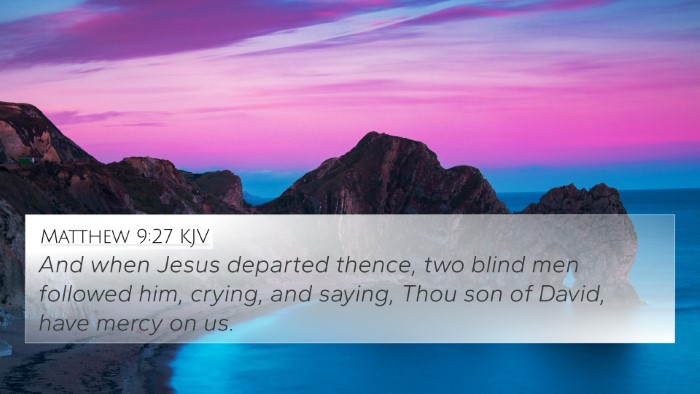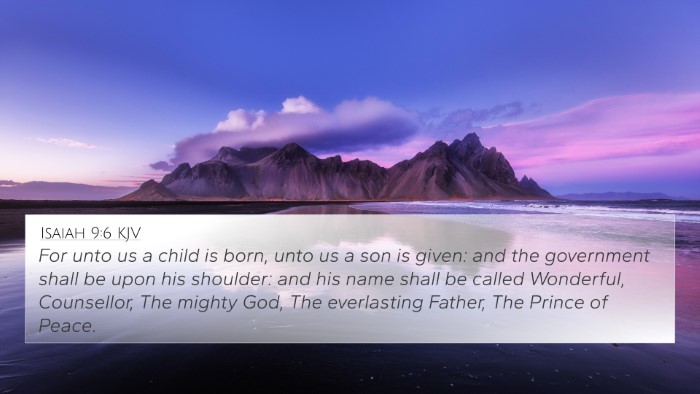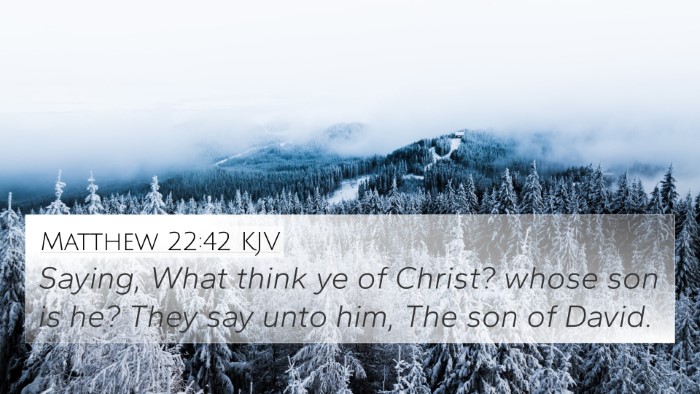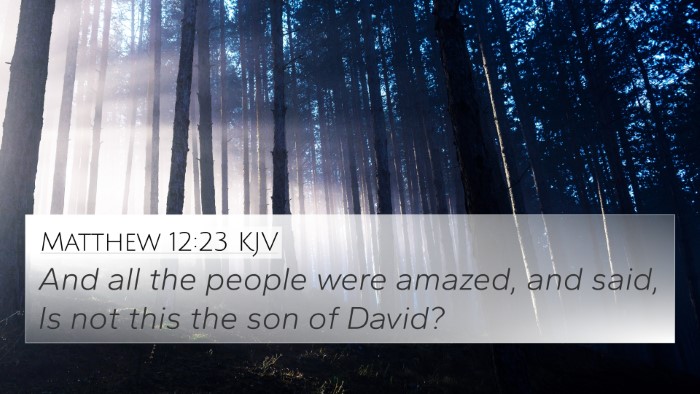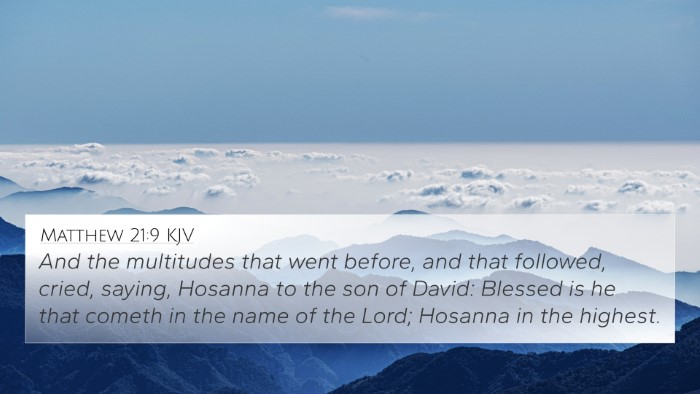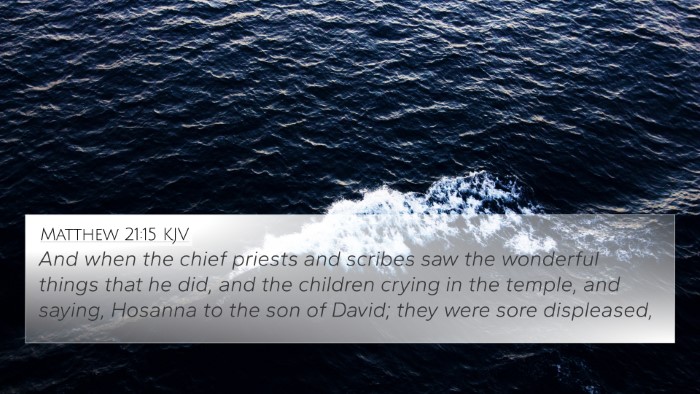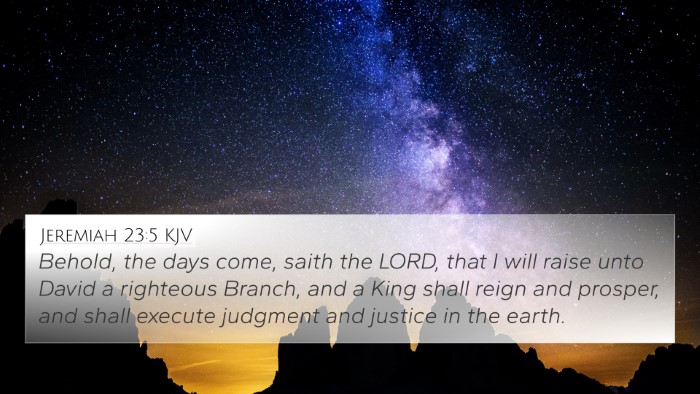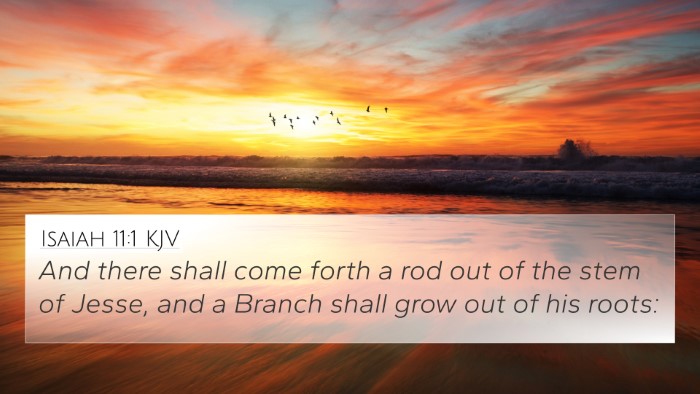Understanding Luke 18:38
Bible Verse: Luke 18:38 - "And he cried, saying, Jesus, thou Son of David, have mercy on me!"
Summary of Luke 18:38
This moment of desperation and earnest call from a blind man exemplifies significant aspects of faith and recognition of Jesus' divine authority.
Contextual Overview
This verse occurs during Jesus’ journey to Jerusalem, where he is approached by a blind man named Bartimaeus. In this encounter, Bartimaeus’s plea illustrates his recognition of Jesus not only as a healer but as the Messiah. The invocation of "Son of David" connects to Old Testament prophecies about the ancestry of the Messiah.
Interpretive Insights
-
Matthew Henry's Commentary:
Henry emphasizes the significance of the man's vocal cry for mercy, highlighting that true faith is often expressed in a loud and clear acknowledgment of Jesus’ sovereignty and grace.
-
Albert Barnes' Notes:
Barnes points out that calling Jesus "Son of David" signifies an understanding of Jesus' messianic lineage. This reflects an awareness of who Jesus is and an expectation of His ability to heal.
-
Adam Clarke's Commentary:
Clarke notes that the man’s request for mercy is a universal plea for help, implying that all human beings, blind or not, are in need of divine assistance in various forms.
Bible Cross-References
Several biblical texts echo themes present in Luke 18:38. These verses may provide deeper insights and connections:
- Matthew 9:27: "And when Jesus departed thence, two blind men followed him, crying, and saying, Thou Son of David, have mercy on us."
- Mark 10:47: "And when he heard that it was Jesus of Nazareth, he began to cry out, and say, Jesus, thou Son of David, have mercy on me."
- John 9:39: "And Jesus said, For judgment I am come into this world, that they which see not might see; and they which see might be made blind."
- Romans 10:13: "For whosoever shall call upon the name of the Lord shall be saved."
- Psalms 51:1: "Have mercy upon me, O God, according to thy lovingkindness: according unto the multitude of thy tender mercies blot out my transgressions."
- Isaiah 35:5-6: "...the eyes of the blind shall be opened, and the ears of the deaf shall be unstopped. Then shall the lame man leap as an hart, and the tongue of the dumb sing..."
- Psalms 130:2: "Lord, hear my voice: let thine ears be attentive to the voice of my supplications."
Thematic Connections
The cries for mercy resonate through various scriptures and tie back to broader themes of healing and salvation:
- Faith and Recognition: Recognition of Jesus’ authority, as seen in Bartimaeus' visible faith, mirrors the acknowledgment in Philippians 2:10-11, where every knee bows to Jesus.
- Desperation for Mercy: The plea for mercy in Luke finds parallels in the desperate cries of various others in the Bible, showcasing a common human need for divine intervention.
- Reactions to Jesus' Presence: Similar to others reaching out to Jesus, Bartimaeus represents the persistent faith articulated in Hebrews 11:6, emphasizing that God rewards those who earnestly seek him.
Conclusion
Luke 18:38 is not just the cry of a blind beggar; it symbolizes the profound recognition of Jesus' identity and power. By studying this verse alongside its cross-references, we engage in a deeper thematic analysis of mercy, faith, and the acknowledgment of Jesus' divine authority across the scriptures.
Tools for Bible Cross-Referencing
To delve deeper into the connections of the Bible verses:
- Bible Concordance: Helpful for finding specific references and connections.
- Bible Cross-Reference Guide: A structural guide to see interrelated themes.
- Bible Chain References: Follows a chain of related verses to build a thematic understanding.



